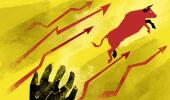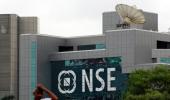Equity markets braved all odds this fiscal and rewarded investors with high returns as the benchmark Sensex surged more than 66 per cent despite COVID-led disruptions and concerns over its impact on the economy.

Market analysts termed FY 2020-21 as a roller coaster ride for not only Indian markets but also for equity indices globally due to the pandemic.
In an unprecedented come back, the 30-share BSE Sensex has jumped 19,540.01 points or 66.30 per cent so far this fiscal.
This extraordinary rally holds significance as markets faced volatile trends this fiscal.
The BSE benchmark hit its one-year low of 27,500.79 on April 3 last year.
But, towards the latter part of the fiscal, indices marched higher and the frontline BSE 30-share index zoomed to its all-time high of 52,516.76 on February 16, 2021.
"The bull-run got further strength with the progressive unlocking and sharp rebound in the economy.
“Discovery of vaccines and optimism it generated gave further strength to the bulls. Globally, markets witnessed a huge rally in November. Emerging markets continued to be flooded with FPI money," V K Vijayakumar, chief investment strategist at Geojit Financial Services, said.
The benchmark Sensex hit record highs multiple times during this financial year which ends on March 31 and just two trading days are left.
The frontline index had closed above the 50,000-mark for the first time ever on February 3 this year, mainly driven by euphoria over the Union Budget.
It closed above the 51,000-mark on February 8.
It rallied over the 52,000-mark for the first time on February 15.
"The 2021 Union Budget was path-breaking. Major reform initiatives like privatisation lifted markets' sentiments further," Vijayakumar said.
From witnessing mammoth losses to record-shattering gains, investors witnessed a wide array of emotions in fiscal 2020-21.
Equity markets had gone into a tailspin in March 2020, with the Sensex sinking a massive 8,828.8 points or 23 per cent during that month as concerns over the pandemic impact on the economy ravaged investor sentiments.
Religare Broking Ltd's Vice President of Research Ajit Mishra said the major factor which assured that the market recovery sustains was the reopening of the economy, which led to the kick-start of businesses.
"Further, government as well as RBI support brought the economy and macro factors back on track.
“Lastly, supportive global markets and the beginning of vaccination drive pushed the markets higher."
Of late, markets have witnessed correction amid rising COVID-19 cases in the country which has dented investor sentiment once again.
"Now, a major concern is a second, and in certain parts of Europe a third, wave of COVID.
“Even though this is a negative, it is unlikely to impact markets much since vaccination is proceeding at a healthy rate.
“Also, the second wave has not resulted in a lockdown, only limited restriction of economic activity," Vijayakumar said.
On the road ahead, Vijayakumar noted that markets are likely to remain buoyant since the US Federal Reserve is committed to keep interest rates near zero through 2023.
"Recently, markets witnessed some sell-offs when the US 10-year yield rose. If the US 10-year bond yield goes above 2 per cent that can cause a sharp global stock market correction. So, this space needs to be watched," he noted.
According to Mishra, the sentiments have already been impacted for the markets.
"However, we do not expect any panic as investors are well aware that the government's focus is more on reviving the economy. Besides, we expect the vaccine drive to gain momentum in the coming months which would further ease the pressure."
As the second wave of COVID has started impacting investors' sentiments, "we feel some consolidation cannot be ruled out in the near future," Mishra said.
Photograph: Amit Dave/Reuters











 © 2025
© 2025